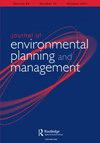规范欧盟的生态创新
IF 3.6
4区 经济学
Q1 DEVELOPMENT STUDIES
Journal of Environmental Planning and Management
Pub Date : 2023-10-11
DOI:10.1080/09640568.2023.2263636
引用次数: 0
摘要
本文构建了一个框架来指导欧盟对生态创新规制的法律形式选择。该框架区分了生态创新的不确定性和风险应用。不确定的生态创新会带来不可估量的风险,因此更难监管,因为欧盟立法者需要积累信息以填补知识空白。在这种情况下,指令优于法规,因为它们有利于实验和信息积累。相反,有风险的生态创新应该受到监管;否则,法律异质性的成本将超过信息积累的收益。我们还表明,有一些方法可以概念化指令和法规之间的选择,这些方法比当前法律思想中占主导地位的主权与竞争模型更有成效。本文章由计算机程序翻译,如有差异,请以英文原文为准。
Regulating eco-innovation in the European Union
This article develops a framework to guide the EU in the choice of legal form for the regulation of eco-innovation. The framework distinguishes between uncertain and risky applications of eco-innovation. An uncertain eco-innovation, which poses an incalculable risk, is more difficult to regulate because the EU legislator needs to accumulate information in order to plug gaps in knowledge. In that context, directives are superior to regulations because they are conducive to experimentation and information accumulation. Risky eco-innovations, conversely, should be covered by regulations; otherwise, the cost of legal heterogeneity would outweigh the benefits of information accumulation. We also show that there are ways of conceptualising the choice between directives and regulations that are more productive than the sovereignty-versus-competition model that predominates in current legal thinking.
求助全文
通过发布文献求助,成功后即可免费获取论文全文。
去求助
来源期刊
CiteScore
9.10
自引率
5.10%
发文量
155
期刊介绍:
Journal of Environmental Planning and Management has already established itself as a leading forum for up-to-date scholarly but accessible papers on all aspects of environmental planning and management. With contributions from leading international authors, the Journal publishes influential, high quality papers -an essential feature whether you are a subscriber, reader, contributor or all three. The Editors and International Editorial Advisory Board are drawn from around the world and are committed to encouraging researchers and practitioners to contribute to multidisciplinary and international debate in the field. The central aim is to focus on the integrated planning and management of the environment.

 求助内容:
求助内容: 应助结果提醒方式:
应助结果提醒方式:


